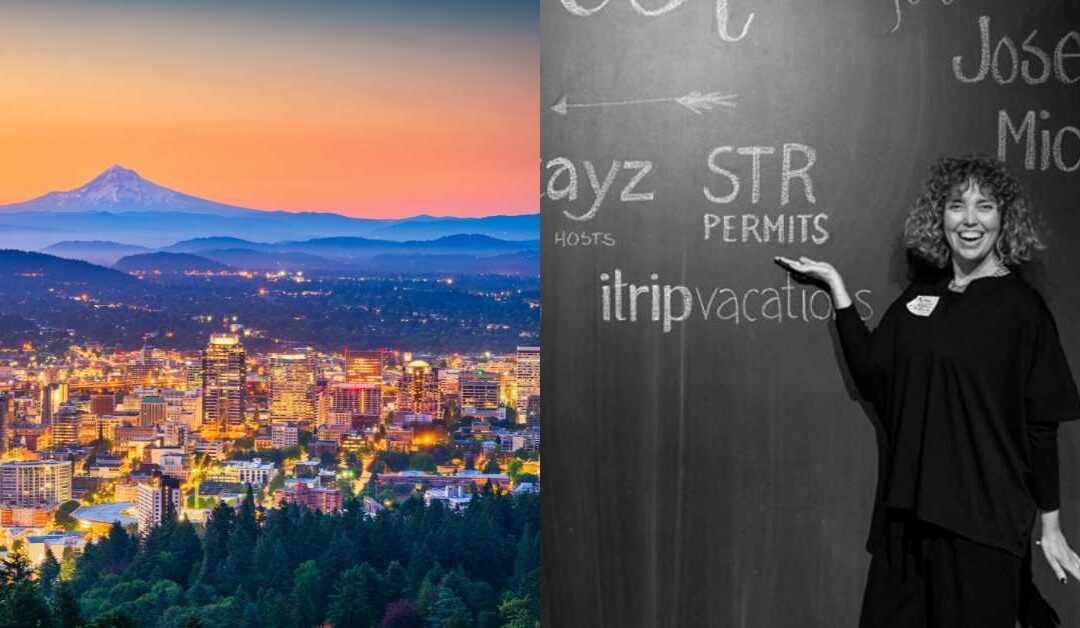After closing her business coaching company, Melissa Wright was searching for her next career step. Her friend Heather wanted to turn her seven-bedroom Victorian home in Portland, Oregon, into a short-term rental and asked Melissa to manage that project. Thinking it would be just transitional work between jobs, she said yes.
Melissa didn’t know anything about short-term rentals, but that was no problem for either of them.
“I said, ‘O.K., I’ll just figure it out; let’s dive in,’ because that’s just the kind of person I am,” Melissa said. “We’d been friends for a long time, and she knew my personality. She knew that I could do it because I’m a solutionizer. I believe we have no problems; we only have solutions.”
Complicated STR permit process
Melissa relished the fun of decorating the home, buying furniture and household items, designing a business model and brand, and creating a listing for STR booking platforms.
Then, the fun took a turn when she realized the short-term rental would need a permit.
She couldn’t find any clear guidance online on how to apply for the permit, so she started visiting Portland’s Development Services Center to ask questions. The city ordinance on STR permits was convoluted, and the city had developed two different permit pathways – Type A and Type B – depending on the number of bedrooms.
“Sometimes you’d wait in line for four hours to get one question answered,” Melissa said. “I didn’t know a thing about it, so I’m just showing up and saying, ‘I hear I have to have a permit. What do I do?’ The way that they operated, they would only give you one piece of information at a time. So I would go, take that information, act upon it, and then go back and say, ‘O.K., now what’s next?’”
Over the next months, Melissa had to go to the Development Services Center three times a week for several hours at a time.
“There’s no way I could have done that if someone wasn’t paying me or if I had another job or anything else that was demanding my time,” she said. “Figuring out how to apply for a permit became my job.”
The time spent waiting to ask one question wasn’t the only frustrating aspect of the experience. Staff at the Development Services Center would often provide Melissa with inconsistent information without any accountability, she said.
“Sometimes, I would spend a week or two acting upon whatever they said that I needed to do and then go back to the Bureau of Development Services, and then they’d be like, ‘Oh no, that person told you the wrong thing,’” she said.
The City of Portland later produced a pamphlet to help homeowners applying for the more complicated permit, Type B, but Melissa said more than half of the steps are missing from the city’s guide.
“I realized this is so challenging and a huge barrier to entry because any normal person … would not be able to figure this out without stopping everything else that they’re doing,” she said.
Difficulty sparks a new short-term rental business idea
After setting up her friend’s short-term rental and debuting it on Airbnb, Melissa decided she didn’t want to take over management of the property.
Instead, she wondered if she could start her own business helping others through Portland’s convoluted permitting process. She shared her concept with the owner of a national property management company based in Portland.
“I was like, is this a viable business to help people get these permits?” Melisa said. “And she was like, “Absolutely. We’d love to have someone like you for our clients. That’s then going to get us more work because our clients are going to be able to have their permits.’”
Melissa continued networking with other property managers to let them know how she could help.
“That way, they can onboard their clients because they’ll have their permitting taken care of, which is such a big deal,” she said.
One-of-a-kind STR business
In spring 2017, she officially founded her company, STR Permits. The company started in Portland but eventually expanded to other cities in Oregon, all of which have their own unique STR ordinances and permit requirements.
The City of Portland has two permit types: Type A for homeowners who are interested in renting out one to two bedrooms and Type B for three to five bedrooms. The Type A permit application is relatively simple and straightforward, but the Type B permit is anything but. Type B is more involved because it’s considered a permanent land use change. Applicants are required to submit architectural drawings and pay for a traffic study.
Applying for a Type B permit also is time sensitive and must be completed within 12 months or less.
In fact, Melissa advises against submitting an application until an applicant has gathered all of the required information and paid for all of the studies. The application fee is $6,000, and the clock starts ticking as soon as the application is submitted. If the clock runs out, you must pay the $6,000 fee again.
“So that’s what I help my clients to do is I only submit complete applications to the city after we have everything handled and taken care of and ready to go.”
Typically, it takes Melissa about two to three months to gather all of the information and complete the application, provided that there is no open construction or remodeling on the property. It takes about 90 days for the city to issue an approval or rejection.
Since 2017, Melissa has completed nearly 100 permits, 23 of which were Type B. There are only 103 recorded permits of that type in Portland, meaning Melissa has completed around 22% of all approved Type B permits in Portland.
Opportunity for other entrepreneurs
Melissa doesn’t know of any other businesses like hers. In fact, it presented a problem when she was trying to optimize her website for search: There are no search terms for her kind of business.
But the opportunity is ripe for other entrepreneurs who would like to imitate what she has done in other cities around the country.
“In other cities, obviously permitting is completely different, which is part of the challenge, but also part of the opportunity for an entrepreneur that wants to get into that,” Melissa said. “I have not found any other service providers doing this, which is a shame. The hosts need help, and I’d like to see more people doing this.”
Melissa has never owned or operated an STR, but she loves the concept of homeowners using an asset they already have to earn side income and share a local experience with a traveler.
“Short-term rental hosts are just so cool,” she said. “They know where all the hotspots are, and they’re connected. It’s a unique type of person that wants to share their home and share their city.”
•••
SUBSCRIBE TO GET UPDATES



